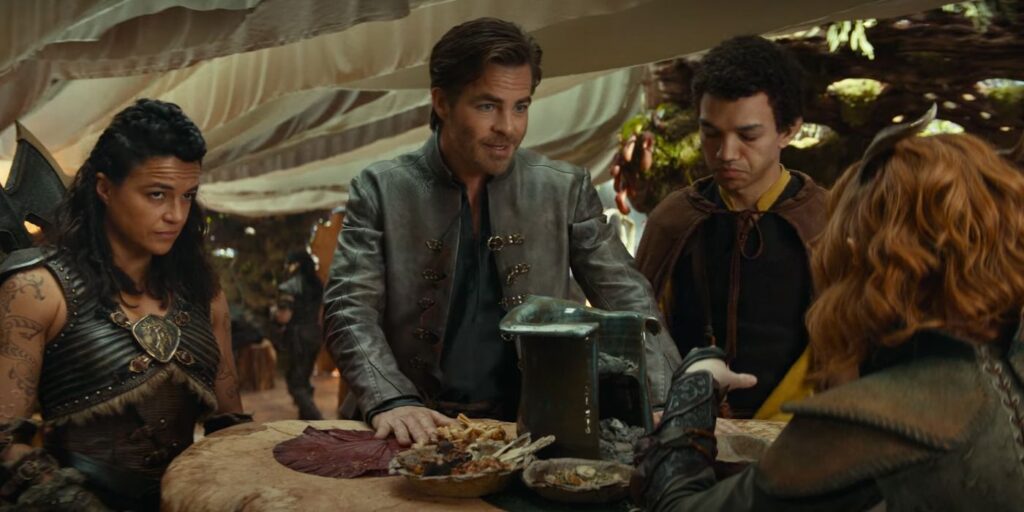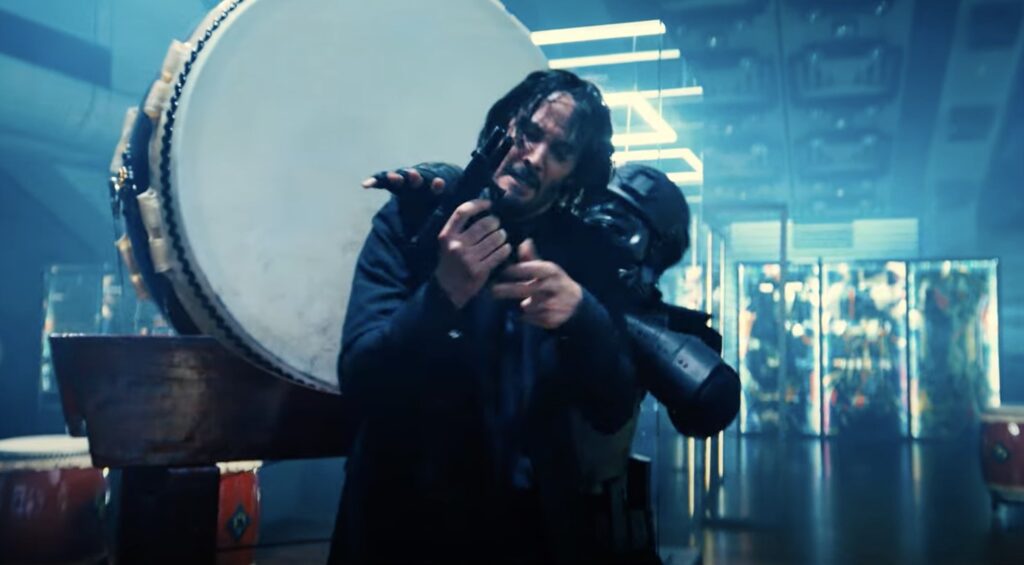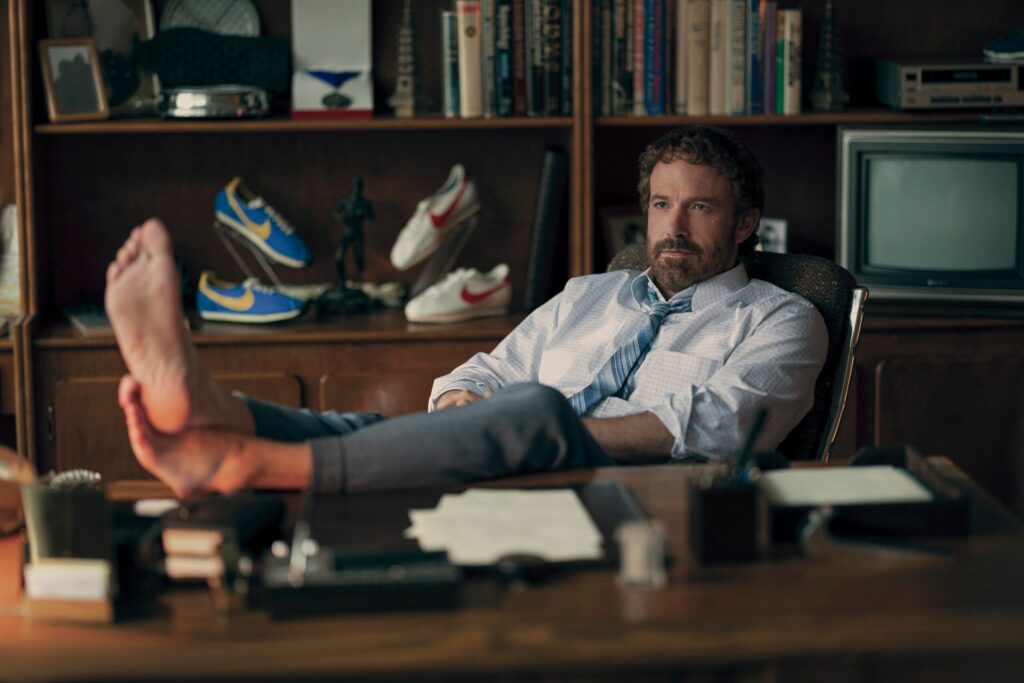
I’m always looking for that screenwriting angle to an industry story.
So when I see that Dungeons and Dragons couldn’t quite manage 40 million dollars on its opening weekend in an industry where big-budget films need to make 60 million dollars *AT LEAST* to be considered a success, I ask, “What can we learn from this?”
Or when I see that last weekend’s belle of the ball, John Wick 4, dropped a significant 62% in its second weekend (John Wick 3 dropped only 56% in its second weekend), I openly wonder, “Is there a writing issue here?”
Let’s start with Dungeons and Dragons. I don’t think it matters what you do with this property – it’s not going to work. The primary problem is, when I say, “Dungeons and Dragons” and ask you what images come to mind, I’m guessing the answer is “nothing.” Because it’s not like Star Wars where you immediately think of lightsabers. Or Lord of the Rings where you have clear images in your head of creatures like Gollum. Or Marvel, where you imagine a dozen different superheroes.
Dungeons and Dragons literally makes you think of a generic looking dragon. Or a generic looking cave. Or a generic looking orc. There’s no specific imagery. And specific imagery is what sets IP apart from original ideas. If I pitch you a Peter Pan movie, that’s going to put a specific image in your mind, compared to if I pitch you a Flyborne Felix movie.
That makes Dungeons and Dragons one of the rare instances of IP that operates like an original idea. It’s not bringing IP value to IP. Which is the whole point of IP!
Another problem with Dungeons and Dragons is the studio’s attempt to turn it into a comedy. I know a few people who play the game. I don’t personally play it. But my understanding is that it’s not a comedic game. It’s more of a strategic game that the people who love take seriously.
If superhero movies have taught us anything, it’s that the closer you draw from the source material, the better. By making the Dungeons and Dragons movie highly comedic, aren’t you moving away from the source material? Are Dungeons and Dragons players the types who say, “Man, did you hear how funny they made Dungeons and Dragons? I gotta see that. It’s such a good idea to make it funnier!” I’m guessing nobody said that.
Which goes back to the truth of the matter, which is that this isn’t a solid enough property to build a franchise on. It just isn’t. And the box office bore this reality out. That’s something every writer should be aware of: Is my idea good enough to write a script about? Because, if it isn’t, it doesn’t matter how good your execution is. It doesn’t matter what your angle is. Your idea was never strong enough to support a feature film.
Which is why I can complain about how Dungeons and Dragons shouldn’t have been so comedic but I know that even if they’d gone the serious route, it was still going to tank. Cause it’s built on top of a weak foundation. There’s not a single recognizable character or creature here. So it’s not surprising that D&D, like its predecessor in 2000, will fade into the night, never to be remembered again.
Our second big movie lesson comes from John Wick 4’s big second weekend dip. A 62% drop isn’t as bad as Quantumania’s 70% drop. But like I said above, it’s a fairly significant drop compared to the third film, and this from a movie that’s gotten a lot more attention. So what’s going on here?
 No, you are not experiencing deja-vu. This move is happening for the 980th time this movie.
No, you are not experiencing deja-vu. This move is happening for the 980th time this movie.
At first I thought it was the length. That’s what she said. But Avatar 2 and its 9-hour running time becoming one of the highest grossing movies ever put that theory to rest. But I do think time is a part of the problem, specifically REPETITION. This is something I see all the time in weak scripts, which is the repetition of things we’ve already seen.
John Wick’s biggest weakness is its insistence on fighting and shootouts that repeat the same moment over and over again. I mean, how many times did we see John Wick grapple with someone, shoot him a few times, kick and punch, before taking them down and shooting them to death. There literally had to be 75 kills that played out in the exact same way.
If they would’ve cut those in half, not only is the movie going to move faster, but the kills then take on more significance, since the rarer something is, the more valuable it is.
For any movie, the opening box office of the film is based on five things – the concept, the directing, the IP, the marketing, and the cast. But the second weekend is based on one thing: THE WRITING. If the writing is good, everybody who saw your movie on that opening weekend will tell their friends and talk it up on social media. That’s when you get small second weekend drops. If you get a big dip, the issue is the writing.
This is not surprising for the John Wick universe, as this property has never been about the writing. Even John Wick is more of a movie star persona (Keanu Reeves) than a character. We don’t really know anything about John Wick other than he likes to shoot guns. He’s similar to Ethan Hunt in Mission Impossible. The average person who watches Mission Impossible doesn’t even know Ethan Hunt’s name. They know him as Tom Cruise.
Movie star driven movies can work. I’m not bashing them. The problem becomes when you rest on that and don’t think you need to write as good of a script because of it. A lot of these big movies fall into that trap. John Wick 4 dropped the ball there. They became so obsessed with the production design and the fighting choreography that no one thought to say, “Hey, maybe we shouldn’t have 6000 fights that look exactly the same.”
Cause I’ll be honest with you. I almost didn’t give John Wick 4 a passing grade. Specifically because it was so much of the same moment over and over.
The good news is, we’ve got “Air” coming up next weekend. It’s a great script that broke into my Top 25. The movie’s supposed to be just as good as the screenplay. Previously, I only had the review inside a newsletter. But for those who don’t receive my newsletter (e-mail carsonreeves1@gmail.com with subject line: NEWSLETTER to sign up) I’m including the review below, when the script was titled, “Air Jordan.”
Genre: Sports Drama
Premise: In 1984, an out-of-shape bulldog of a sports executive at a small shoe company called Nike attempts to sign the hottest basketball player out of college, Michael Jordan.
About: This is that big splashy deal that just came together. Ben Affleck will direct (and star). Matt Damon will star. Amazon is the buyer. This is a huge win for the writer, Alex Convery, who doesn’t even have a produced credit yet. I’ve reviewed a couple of his scripts, Bag Man and Excelsior, both of which I liked. So this guy’s got the goods. No doubt this project came together in the wake of the success of HBO’s Winning Time.
Writer: Alex Convery
Details: 104 pages.

As someone who grew up in Chicago during the Jordan era and who used to routinely go to the old Chicago Stadium to watch the Bulls play, I can say that I am both excited and not so excited for this script.
I’m excited because I get to go back in time and relive some powerful memories. I’m not excited because I’m not convinced there’s a story to tell here. When you’re going so deep into the Jordan mythology that you’re covering some orbiter of an orbiter of Jordan’s sun, you’re testing the limits of what people care about. I mean, what’s next? The story of Cher’s first hairdresser’s assistant?
Then again, isn’t that all scripts? You don’t care until you do. Let’s see if we do!
45 year old slovenly Italian-American Nike shoe executive Sonny Vaccaro is looking at an uncertain future. He works in the basketball department for Nike, a tiny shoe company that specializes almost exclusively in its CEO’s first love, running.
In 1984, Nike doesn’t care about basketball because nobody cares about basketball. The NBA championship isn’t even broadcast live! So it makes sense why Sonny’s boss, Phil Knight, is only giving the basketball department 250,000 dollars to sign three rookie basketball players to shoe deals.
Now you have to understand, back then, there was no such thing as a personalized shoe. You wore whatever shoes the companies made. And Adidas and Converse had much cooler shoes than anything Nike had created.
While the rest of his team is resigned to signing scrub basketball players, Sonny is obsessed with getting Michael Jordan, a huge problem because Phil won’t give him the money to sign him and Jordan’s agent, David Falk, says Jordan doesn’t even want to meet with Nike. He’s set on Adidas.
This is when Sonny has his epiphany: A PERSONALIZED shoe built around the player. They’re going to mold it to his foot. They’re going to design it the way he wants it designed. And they’re going to give it a name – Air Jordan – that will work to market him while he’s playing.
Now all Sonny has to do is figure out a way to get in front of Jordan and make his pitch. When all avenues fail, Sonny heads out to North Carolina to talk to Jordan’s parents. Used to slimy tactics from agents and executives at this point, they don’t want any part of Sonny. But while Sonny can’t dunk from the free throw line, he does have a superpower of his own: HE NEVER STOPS TRYING. And he will pursue Jordan til the bitter end.
The first thing that comes to mind when I read a script like this is a rarely talked about writing tool, which is audience dramatic irony. Traditional dramatic irony is when the audience knows something the main character does not. Audience dramatic irony is when the audience knows more than every single character in the story. Titanic is an example. We know the ship is sinking. They don’t.
Audience dramatic irony can be played to all sorts of effect and is perfect for scripts like this, where the audience already knows a bunch of details. For example, there’s an ongoing discussion within Nike on whether Michael Jordan is worth spending their entire basketball budget of 250,000 dollars on. We, of course, know that Michael Jordan will be worth billions of dollars to Nike in the future. So it’s funny to watch them squabbling over such a minuscule number.
Or you get moments like Sonny meeting with the general manager of the Portland Trailblazers, who infamously passed on Michael Jordan with the number one pick (The Chicago Bulls would end up picking him at number 3). Sonny is trying to figure out from the guy why he passed on Jordan, try to get a little intel to help him decide what to do. After a while, the GM gets annoyed with Sonny’s line of questioning and says, “What, you think I’m going to be remembered as the man who passed on Michael Jordan? Come on, Sonny. Players come and go. No one’s remembered for just one player.”
But the big reason this script works and the reason it will be a hit is because of one of the most basic screenwriting principles in the book – IT’S GOT A MAIN CHARACTER WHO WANTS SOMETHING REALLY BADLY AND HE GOES AFTER IT WITH ALL HE’S GOT.
This whole script is about a guy determined to get something – sign Jordan. That’s it. We always feel like we’re moving forward because every interaction Sonny has is for that larger goal. This is when scripts really cook, when you institute this simple principle. It’s when characters have muddled motivations and don’t really care about what they’re after that scripts become boring (later Scriptshadow Edit: look no further than the third season of The Mandalorian).
Once you establish that drive to succeed, you simply make succeeding as hard as possible. Sonny’s boss, Phil Knight, won’t give him the budget he needs to sign Jordan. Jordan’s agent, David Falk, tells him don’t even try. Jordan’s signing with Adidas. Jordan’s parents tell Sonny, “He’s not going to sign with you. Give up.”
What readers and audiences like is determined characters going up against giant “no’s” who then overcome those no’s one by one. The reason audiences connect so closely with this formula is because most people in life get beaten down by obstacles. At a certain point, they give up. So to see someone not give up is wish-fulfilling and life-affirming. Because they say, “Well, this guy can do it. Why can’t I?” And they leave that script or that movie charged up.
An ancillary benefit of this is that many of your scenes will write themselves. Think about it. You have a guy who needs something badly. You have a line of characters who want to keep him from getting it. This ensures that EVERY SINGLE SCENE is set up to succeed. Because the best scenes tend to be when someone wants something and someone else doesn’t want to give it to them. Writers do mental cartwheels trying to find scenarios that will allow them to use this formula in as many scenes as possible. However, when it’s baked into the premise, like it is with “Air Jordan,” you just show up for the scene “room” and the chairs and tables have already been arranged for you.
It’s also a really fast script to read because it’s all dialogue. And this is something I tell writers all the time: If you’re good at dialogue, write scripts where all anybody does is talk because those scripts read the fastest. And “a fast read” is crack to a busy industry person.
I tried reading a professional script the other day and it was like walking through quicksand with boots made of concrete getting through those pages as it was all really dull and elongated description. This is the opposite. Every scene is the dialogue-friendly character of Sonny walking into a room and trying to convince another character of something.
Totally see why Matt and Ben fell in love with this. Air Jordan is a slam dunk.
[ ] What the hell did I just read?
[ ] wasn’t for me
[xx] worth the read
[ ] impressive
[ ] genius
What I learned: Strike when you’ve got a screenplay that exists in the same world as something that’s hot right now. A script about otters is dead in the water until, one day, a movie about beavers clears 100 million in its first weekend at the box office. Air Jordan, no doubt, started getting pushed heavily around town once the documentary, Winning Time, became a hit. If you’ve got anything that’s similar to a movie or show that everyone’s talking about, call every contact you know, no matter how peripheral, and pitch your script to them. If it’s anything close to that hot new successful thing, they’ll want to read it.
What I learned 2: For the really savvy screenwriter, track shows that are similar to your idea BEFORE THEY GET ON AIR. You are waiting for them to do well so that when they do, you have already lined up your ducks. I bet my Jordan memories that’s what happened here. They saw that Winning Time was coming out and built a campaign around sending that script to everyone once the buzz for the show ratcheted up. You’re playing with the big boys here. Do your prep work and stay ahead of the curve.

